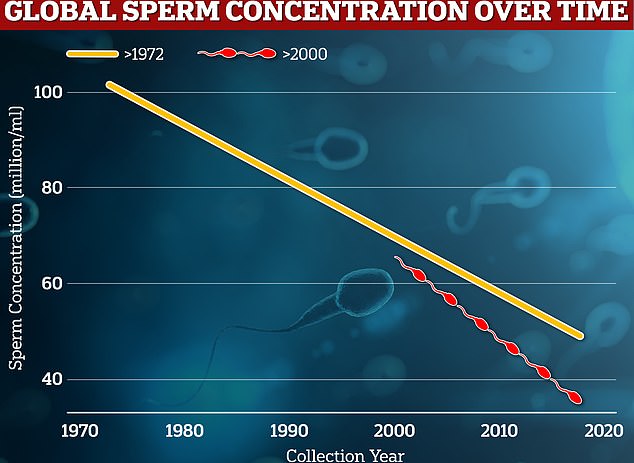Thousands of men die prematurely every week in the UK because society fails to take their health seriously, a damning report warns today.
The Real Face of Men’s Health report says two in five men (39 per cent) are dying younger than they should, meaning 133,000 lives a year are lost too soon.
Many could have been saved with better access to screening for diseases such as prostate cancer or by breaking the taboos that delay them seeking care, he added.
Others would have lived longer if they had received help to improve their lifestyle, including cutting down on alcohol, junk food and tobacco, and getting more exercise.
Men are less likely to attend screening appointments and health checks with their GP than women, putting them at risk of late diagnosis of conditions such as cancer and heart disease.

Internet personality Sam Cornforth and former TOWIE star Pete Wicks have teamed up with Movember ahead of Testicular Cancer Awareness Month in April

The Distinguished Gentleman’s Ride in London raised money and awareness for Movember in May
The charity Movember has denounced men’s health as being “relegated to the back burner” and says its report should serve as a “wake-up call” to the unacceptable state of men’s healthcare in the UK.
There are calls for a dedicated men’s health strategy to reverse the decline in men’s life expectancy and a dedicated national clinical director for men’s health, reflecting the existing role for women.
The report highlights how men’s health in the UK lags behind most other wealthy nations and highlights the devastating impact of the crisis on men and their families.
A boy born in the UK in 2021 can expect to live to 78.7 years old, four years less than a girl.
It is also three years younger than children in Switzerland, 2.6 years younger than children in Australia and 1.3 years younger than children in Ireland.
In England and Wales, suicide is the leading cause of death among men aged 20 to 34, and the suicide rate is generally three times higher among men than among women.
The report reveals that men are less likely to have healthy lifestyles than women and are more likely to smoke, drink alcohol, use drugs, have high cholesterol and high blood pressure.
They are also less likely to attend screening appointments and health checks with their GP, putting them at risk of late diagnosis of conditions such as cancer and heart disease.
A new survey for the study shows that two-thirds of men (64 percent) wait more than a week with symptoms before visiting the doctor, while one-third (31 percent) will wait more than a month.
And when men do seek help, health systems are ill-equipped to provide them with “engaging, appropriate and effective care,” the report said.
Many men (62 percent) say they want to leave their current doctor or have left a previous one because of a lack of “personal connection.”
Around 48 per cent believe it is normal practice to avoid health checks, and less than 40 per cent take up the offer of an NHS health check for which they are eligible.
The report reveals that men are deterred from seeking help because of “stigma” or “traditional masculine norms” which suggest they should “man up” and endure the pain or risk being ridiculed by women for having “man flu”.
Movember claimed that tackling preventable diseases in men could have saved the UK £9.4bn by 2023 alone – enough to cover the costs of nine of England’s largest hospitals.
Researchers stress that the impact is felt beyond the men themselves, as their partners, mostly women, are often forced to act as carers when they fall ill and then left to fend for themselves when they die.
Michelle Terry, chief executive of Movember, said: ‘The report’s findings should serve as a wake-up call about the unacceptable state of men’s health across the UK.
‘For too long, men’s health has been relegated to the back burner in broader health conversations. Men’s health does not exist in a vacuum.
‘If we want these tragic numbers to decrease and better support the men in our lives, real change is urgently needed.

The graph shows: Sperm concentration rate is declining worldwide from samples collected between 1972 and 2000 (orange) and since 2000 (red).
“We need to invest in education and reform the health system to meet the unique needs of all genders and have a dedicated men’s health strategy if we really want to make progress.”
The report found that men living in the ten electoral districts with the highest premature death rates are almost 3.5 times more likely to die early than men living in the ten electoral districts with the lowest rates.
He says: ‘Twenty years of campaigning for men’s health has taught us that we all have a story to tell.
‘Stories of men who are unaware of the risks and who do not pay attention to their physical and mental health.
‘Stories of men who wait too long to speak to a healthcare professional or who simply have a bad experience when they do.
“Every day we hear from the men themselves, but also from their wives, mothers, sisters, partners, neighbors, children, teachers and doctors.”
He added: “This report outlines the state of men’s health across the UK and makes clear the benefits that could flow to families, communities and societies if we improved men’s health, including the billions saved by preventing avoidable diseases in men and improvements in the everyday lives of men and those closest to them.
“Men’s health affects each and every one of us and we invite policy makers to be part of history to achieve positive change.”
William Roberts, chief executive of the Royal Society for Public Health, said: ‘Too many men die too young and too many men suffer poor health from preventable diseases.
“It is vital that we address the underlying causes of men’s ill health. Men’s health affects us all and we must consider it a fundamental aspect of a healthy nation.”
A Department of Health and Social Care spokesman said: ‘This government’s mission is to get the NHS back on its feet so it is there for everyone.
We know that men can be reluctant to reach out to health and other support services.
‘Asking for help is not a sign of weakness and we encourage anyone to speak to their GP if they have concerns about their mental or physical health.
“Prevention is better than cure, so this government will also shift the focus of healthcare from simply treating diseases to supporting people to live longer, healthier lives.”


